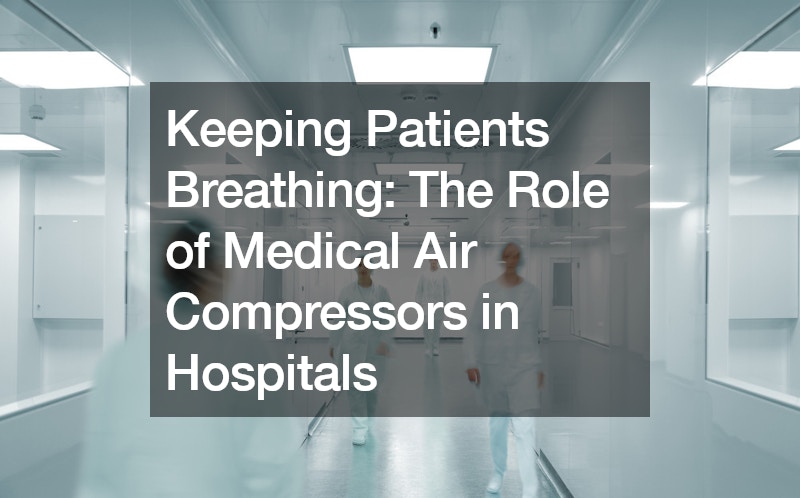
Modern hospitals are marvels of medical technology, constantly striving to provide the best possible care for patients. Behind the scenes, a complex network of systems ensures everything runs smoothly. One crucial component, often taken for granted, is the medical air compressor. These workhorses provide a clean, reliable source of compressed air that is vital in keeping patients breathing and facilitating various critical medical procedures.
The Breath of Life: Medical Air Compressors in Action While oxygen is essential for life, hospitals require more than just pure oxygen. Medical air compressors provide a constant supply of compressed air used for various purposes, including:
Ventilation: In intensive care units (ICUs), critically ill patients often require ventilators to assist or completely control their breathing. These machines rely on compressed air to inflate and deflate the lungs.
Anesthesia: During surgeries, patients undergo anesthesia, which can temporarily depress their respiratory function. Medical air compressors provide compressed air for ventilator support or to inflate breathing bags used by anesthesiologists. Nebulizers: These devices deliver medication in a fine mist, making them ideal for treating respiratory conditions like asthma. Medical air compressors power nebulizers, forcing air through a liquid medication to create an inhalable mist. Surgical Tools: Many surgical instruments, particularly those used in laparoscopic and minimally invasive procedures, utilize compressed air. Air Filtration Systems: Modern hospitals maintain strict air quality standards. Medical air compressors can power air filtration systems that help ensure a clean and sterile environment for patients and medical staff. Beyond Functionality: Reliability and Safety are Paramount
In a hospital setting, reliability and safety are paramount. A malfunctioning medical air compressor can have dire consequences, potentially jeopardizing patient care. Companies like Gtec specialize in designing and manufacturing medical air compressors that meet these stringent requirements. Here’s what sets them apart:
Oil-Free Operation: Traditional air compressors often use oil for lubrication, posing a contamination risk in a medical environment. Gtec medical air compressors utilize oil-free technology, eliminating the risk of oil contamination in the compressed air supply. Continuous Operation: Hospitals operate 24/7, and their medical air supply needs to be equally dependable. Gtec air compressors are designed for continuous operation, ensuring a reliable air supply around the clock. Redundancy Systems: Hospitals often incorporate redundancy measures into critical systems. Gtec offers medical air compressor systems with built-in redundancy, meaning that if one compressor fails, another can take over seamlessly, ensuring an uninterrupted air supply. Alarm Systems and Monitoring: Early detection of any potential issues is crucial. Gtec air compressors incorporate sophisticated alarm systems that warn of any fluctuations in pressure or other operational concerns. Additionally, remote monitoring capabilities allow for proactive maintenance and troubleshooting. Beyond the Basics: Additional Considerations While the primary function of medical air compressors is to provide air, several additional factors influence their selection and implementation in a hospital setting:
Capacity and Efficiency: The size and needs of a hospital determine the required air compressor capacity. Gtec offers a range of compressors to suit the specific demands of different healthcare facilities. Additionally, energy efficiency plays a crucial role in hospital operations. Gtec air compressors are designed for optimal efficiency, minimizing energy consumption and reducing long-term operational costs. Ease of Maintenance: Regular maintenance is essential for ensuring the smooth operation of medical air compressors. Gtec air compressors are designed to be user-friendly and require minimal maintenance, minimizing downtime and maintenance costs. Compliance with Regulations: Hospitals must adhere to strict regulations regarding medical equipment. Gtec air compressors are manufactured to meet all relevant international standards for safety and performance in medical environments. Beyond Products: Partnering with Experts Choosing the right medical air compressor system requires expertise and careful consideration of a hospital’s needs. Companies like Gtec go beyond simply providing products. They offer comprehensive support, from initial consultation to installation, training, and ongoing service. This ensures that hospitals get the right system for their needs and have access to the necessary expertise to keep it running smoothly.
In conclusion, medical air compressors play a vital role in modern healthcare. These unsung heroes quietly ensure a constant supply of compressed air that supports critical medical procedures and helps patients breathe. By focusing on reliability, safety, and user-friendly design, companies like Gtec provide hospitals with the tools they need to provide the best possible care for their patients. The next time you visit a hospital, take a moment to appreciate the essential, yet often unseen, role these medical air compressors play in keeping patients breathing and hospitals functioning effectively.
.




